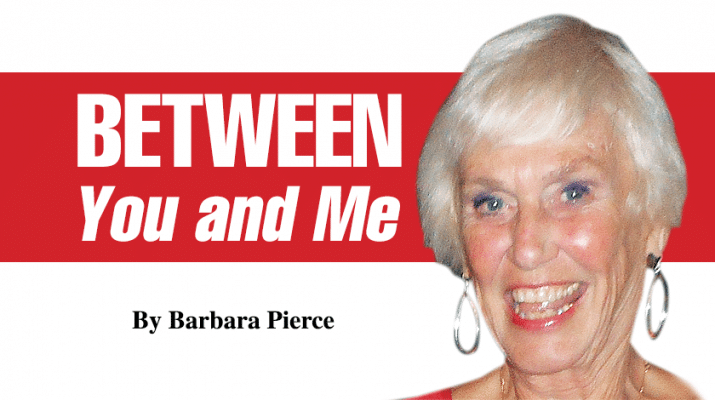By Barbara Pierce
Yes, I admit I’m a control freak. What can I do?
My granddaughter is starting her own business and I’m sure she can be a success. I have a lot of great ideas about what she should do and how she should do. She’s receptive to my ideas, but I’m sure I’m overwhelming her. She needs to go at her own pace and develop her own ideas.
Yesterday my sister called me, complaining about her boss and how her boss takes advantage of her and she’s so miserable, hates her job. I gave her suggestions on how to be more assertive with her boss to solve the problem. She got mad and me and hung up.
And then my brother called to complain his wife got into another accident when driving drunk. I said “She’s going to kill someone one of these days and how will you feel then?” And “You really need to leave her and her drunken drama!” He hung up.
Yes, I do have a control problem.
As the oldest, I’ve always felt responsible for them. I’ve always felt I know what’s best for them —and for my friends, child, grandchildren.
I worry about all of them. I know nobody really wants my advice. I know they do have to figure things out for themselves.
I know, with absolute certainty, that it is only when one figures out what will work for themselves, figures it out in their head, that they will make it work. If they followed my suggestions, things may not work out right. Either because they’d sabotage it or they aren’t really committed to my plan.
That’s the way we humans are wired. We try much harder when it’s our own plan. We’re more determined to make our own plans work.
Yes, I can influence others, but I can’t control them. When I worked as a psychotherapist, I learned to do this skillfully. I learned to guide my clients to think through the situation in their own heads and come up with their own solution. Because we “collaborated,” they were committed to making that solution work for them.
Why can’t I do this in my personal life?
How to stop being a control freak isn’t easy. Here is what I need to remind myself of:
Experts say, to learn to be less controlling, first figure out the reasons that drive it. When I admit to myself the reasons why, I don’t much like the answers. I’m not proud of myself.
Offering my advice to others makes me feel needed. It makes me feel important.
And I suppose I do have a need for perfectionism. Nobody else can get it right. I can only rely on myself. I can’t trust others to get it right.
Next, I need to become aware and accept that I’m not really helping others with my interfering behaviors. I need to ask myself “Is what I’m doing helping them? Or it is only confusing them more, not really helping to solve the problem?”
Then —and this is probably the key thing —I need to change the words I use. Learning to be less controlling requires different language. For example, when I met with a client who was reacting in incredibly wrong ways to her situation, I might say “Have you ever thought about other things you could do instead?” and get her to think through better ways to deal with it. And I would never say a word that was critical or judgmental about her poor judgment.
Or, I might say “What goes through your mind now, thinking about what you’ve just said?” to get her to think about a different perspective on her situation.
I haven’t been doing that lately. I need to change the words I use, to more gentle, caring words that get the other person to think about their situation and come up with ways of handling it differently.
I also need to change my own internal self-talk. I need to ask myself: “If I don’t give my advice, what’s the worst that could happen?” “What am I afraid will happen if I don’t control this situation or this person?” “Am I expecting the worst?” “What are the chances that the worst will really happen?”
I need to understand what it is I’m afraid of and determine if it’s realistic. Because often we exaggerate both how bad the outcome will be and how likely it is to happen. Sometimes bad things will happen and there’s little I can do about it.
I need to frequently remind myself that controlling doesn’t work. That no one wants my advice. They have to figure it out for themselves.
And I need to stay focused on the problems that are truly mine to solve. I need to remind myself I can only control myself and my behaviors. And that my way isn’t the only way. I will respect other people’s choices.
 Barbara Pierce is a retired licensed clinical social worker with many years of experience helping people. If you would like to purchase a copy of her book, “When You Come to the Edge: Aging” or if you have questions for her, contact her at barbarapierce06@yahoo.com.
Barbara Pierce is a retired licensed clinical social worker with many years of experience helping people. If you would like to purchase a copy of her book, “When You Come to the Edge: Aging” or if you have questions for her, contact her at barbarapierce06@yahoo.com.

